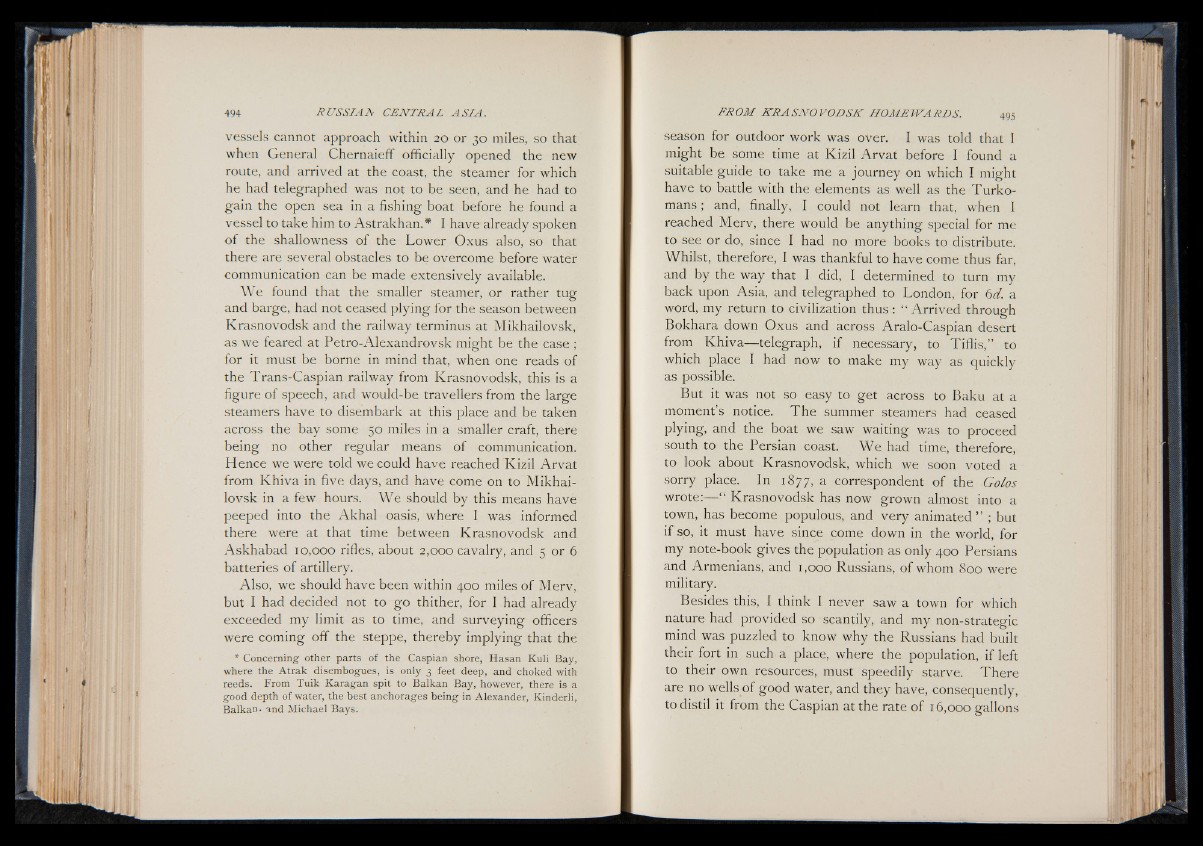
vessels cannot approach within 20 or 30 miles, so that
when General Chernaieff officially opened the new
route, and arrived at the coast, the steamer for which
he had telegraphed was not to be seen, and he had to
gain the open sea in a fishing boat before he found a
vessel to take him to Astrakhan.* I have already spoken
o f the shallowness of the Lower Oxus also, so that
there are several obstacles to be overcome before water
communication can be made extensively available.
We found that the smaller steamer, or rather tug
and barge, had not ceased plying for the season between
Krasnovodsk and the railway terminus at Mikhailovsk,
as we feared at Petro-Alexandrovsk might be the case ;
for it must be borne in mind that, when one reads of
the Trans-Caspian railway from Krasnovodsk, this is a
figure of speech, and would-be travellers from the large
steamers have to disembark at this place and be taken
across the bay some 50 miles in a smaller craft, there
being no other regular means of communication.
Hence we were told we could have reached Kizil Arvat
from Khiva in five days, and have come on to Mikhailovsk
in a few hours. We should by this means have
peeped into the Akhal oasis, where I was informed
there were at that time between Krasnovodsk and
Askhabad 10,000 rifles, about 2,000 cavalry, and 5 or 6
batteries of artillery.
Also, we should have been within 400 miles of Merv,
but I had decided not to go thither, for I had already
exceeded my limit as to time, and surveying officers
were coming off the steppe, thereby implying that the
* Concerning other parts of the Caspian shore, Hasan Kuli Bay,
where the Atrak disembogues, is only 3 feet deep, and choked with
reeds. From Tuik Karagan spit to Balkan Bay, however, there is a
good depth of water, the best anchorages being in Alexander, Kinderli,
Balkan, and Michael Bays.
season for outdoor work was over. I was told that I
might be some time at Kizil Arvat before I found a
suitable guide to take me a journey on which I might
have to battle with the elements as well as the Turkomans
; and, finally, I could not learn that, when I
reached Merv, there would be anything special for me
to see or do, since I had no more books to distribute.
Whilst, therefore, I was thankful to have come thus far,
and by the way that I did, I determined to turn my
back upon Asia, and telegraphed to London, for 6d. a
word, my return to civilization thus: “ Arrived through
Bokhara down Oxus and across Aralo-Caspian desert
from Khiva— telegraph, if necessary, to Tiflis,” to
which place I had now to make my way as quickly
as possible.
But it was not so easy to get across to Baku at a
moment’s notice. The summer steamers had ceased
plying, and the boat we saw waiting was to proceed
south to the Persian coast. We had time, therefore,
to look about Krasnovodsk, which we soon voted a
sorry place. In 1877, a correspondent of the Go/os
wrote:— “ Krasnovodsk has now grown almost into a
town, has become populous, and very animated” ; but
if so, it must have since come down in the world, for
my note-book gives the population as only 400 Persians
and Armenians, and 1,000 Russians, of whom 800 were
military.
Besides this, I think I never saw a town for which
nature had provided so scantily, and my non-strategic
mind was puzzled to know why the Russians had built
their fort in such a place, where the population, if left
to their own resources, must speedily starve. There
are no wells of good water, and they have, consequently,
to distil it from the Caspian at the rate of 16,000 gallons